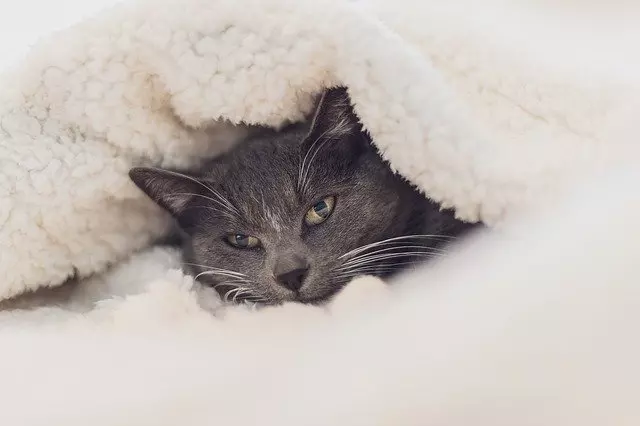Having a favorite snuggle blanket is one thing, but some cats like blankets for more than just getting cozy. They like curling up with blankets and sucking on them like they’re sucking on a bottle or pacifier. Not every cat sucks on blankets, but it’s a relatively common behavior. It can be pretty cute to watch, but there are also cats that get carried away. They can ruin your favorite blankets, and you have to make sure they’re not also chewing and swallowing the fabric. Not to mention it’s hard to fall asleep when your cat is going to town on your comforter. If you notice your kitten, or even adult cat, sucking on blankets, know that there’s a reason why they’re doing it.
Most of the time, blanket sucking is accompanied by other behaviors, like purring and kneading. For most cats, the behavior starts in kittenhood. Sometimes they grow out of it, and sometimes they don’t. There are also adult cats that start sucking on blankets seemingly out of nowhere. To figure out what’s motivating your cat’s behavior, think about when they started and what else has been going on in your life. Then apply these three potential explanations to see which one fits best.
They Left Mom Too Early
The most common reason why cats suck on blankets is because they were separated from their mothers at too young an age. They were weaned too early, and that potentially traumatic experience could have long-term affects. In an ideal world, kittens stay with their mothers until they’re at least eight weeks old. During those early weeks, they get all their nutrition from mom. They nurse and knead their mother’s tummy both when they’re hungry and when they’re seeking comfort. Even when they start eating solid foods, they’ll occasionally go back to mom for that sense of comfort and safety.
But when a kitten leaves mom before they’re fully weaned and confident with being on their own, they can resort back to those kitten-like behaviors. When cats suck on blankets, it reminds them of suckling with their mom. It’s part of their instinct. If a kitten was denied that experience in its youth, it might turn blanket sucking into a lifetime habit.
They’re Dealing With Stress
If an adult cat suddenly has a new habit of sucking on blankets, it might not be because they left mom too early. This behavior has also been linked to stress. Many behaviorists believe it’s a type of coping mechanism cats adopt when they’re dealing with significant anxiety in their everyday lives. It’s a self-soothing strategy that seems to offer some cats relief from mental stress.
There are countless reasons why a cat suddenly becomes stressed. Maybe you recently introduced a new pet into the household, or maybe a change in routine has put them on edge. Some cats also act stressed when they feel sick or are hiding an injury. If they start sucking on blankets in an attempt to make themselves feel better, they might choose to continue the habit even after that initial stress disappears.
It Makes Them Feel Comfortable
Even if your cat isn’t dealing with a significant amount of stress, sucking on blankets can still be a form of relaxation. It reminds them of those early days with mom, and who doesn’t want to feel like a care-free baby every now and again?
For some cats, sucking on a blanket is a way to lull themselves to sleep. Fuzzy blankets especially remind them of those comfy days being cuddled up close to mom. They feel calm and safe. And the more they suck on blankets, the more of a habit it becomes.
Should You Be Concerned?
As long as your cat isn’t chewing or swallowing bits of fabric, there’s nothing for you to worry about. Sucking on a fuzzy blanket won’t hurt them, and it’s probably making them feel good. If you think it’s a stress-induced behavior, however, it’s a good idea to try and identify the cause of the stress. You can help them work through it, but don’t be surprised if the blanket sucking continues. Once cats make it a habit, it can be hard to break.






